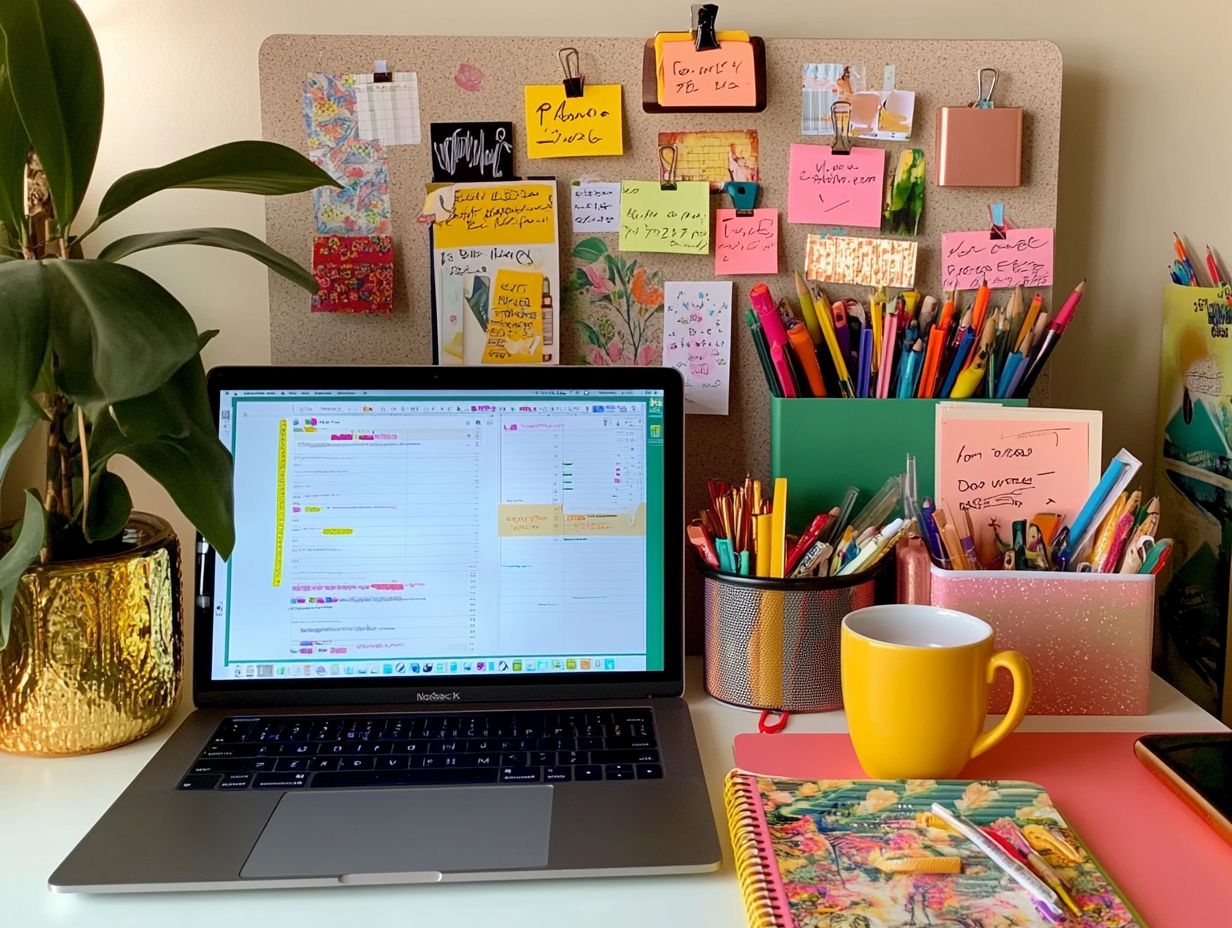In the rapidly evolving landscape of academia, students frequently find themselves balancing numerous responsibilities, ranging from preparing for exams to managing their finances, even seeking scholarships and financial aid to ease their burden.
Life hacks for students provide simple yet effective strategies to help navigate these challenges with greater ease, incorporating various productivity and time-saving strategies.
This article delves into a variety of life hacks specifically designed for students, focusing on key areas such as organization and time management, study tips, financial wisdom, self-care practices, and effective use of technology tools.
Readers will discover ways to optimize their study habits, save money through budgeting, and maintain their well-being, all of which can lay a solid foundation for academic success and personal growth.
What are Life Hacks?
Life hacks refer to clever strategies and techniques designed to enhance productivity and efficiency in our daily activities, particularly for students aiming for academic success. These hacks cover a broad spectrum of techniques, from time management to organization, allowing individuals to streamline their processes, reduce procrastination, and reach their goals with reduced stress.
By employing these skills, students can improve their study habits, manage their time wisely, and maintain a balanced lifestyle while preparing for exams and participating in extracurricular activities. Engaging in volunteer work and internships can also provide practical experience and enhance personal development.
For example, adopting the Pomodoro Technique can significantly enhance concentration by enabling students to study in focused intervals, punctuated by short breaks. Additionally, utilizing digital tools such as task managers or calendars assists students in prioritizing assignments and deadlines, ensuring that nothing is overlooked. Another effective method is the 2-Minute Rule, which encourages individuals to address small tasks immediately, thereby freeing up mental space for more substantial projects. Furthermore, employing memory aids can enhance retention of key information.
By implementing these strategies, students not only improve their efficiency but also develop habits that can foster long-term academic success and personal growth.
Benefits of Using Student Life Hacks
Utilizing life hacks offers a range of benefits for students, facilitating their academic success while reducing stress and enhancing overall well-being. These advantages encompass improved time management, effective study techniques, and heightened motivation, all of which contribute to a more balanced and fulfilling educational experience.
By adopting goal-setting strategies and productivity hacks, students can develop self-discipline and resilience in their academic pursuits while also prioritizing self-care. Time blocking and time tracking are additional techniques that can help with effective time management.
For example, employing techniques such as the Pomodoro Technique can transform study sessions by breaking tasks into manageable intervals. This approach not only enhances focus but also incorporates periodic breaks that refresh the mind.
Additionally, establishing a daily routine that includes physical activity, healthy eating, and mindfulness practices can significantly bolster mental health, enabling students to manage stress more effectively.
Moreover, simple strategies like organizing notes digitally or using apps to track assignments can streamline the studying process, making it feel less overwhelming and more enjoyable. These methods enable students to take control of their educational journey, ensuring they remain motivated and engaged with their studies while maintaining a healthy life balance. Utilizing online resources and tutorials can also support their learning.
Organization and Time Management Hacks
Effective organization and time management are essential for students who wish to excel academically while balancing various responsibilities, including homework, extracurricular activities, and social engagements. Leveraging technology integration can provide additional support in managing these tasks.
By adopting strategic time management techniques, students can develop structured study schedules that prioritize their tasks and maximize their productivity. This approach not only enhances their focus and ability to track goals but also promotes a disciplined study routine, enabling them to maintain a balanced lifestyle while effectively managing deadlines and commitments.
Creating a Study Schedule
Creating a study schedule is a vital time management strategy that enables students to allocate their study hours efficiently. This approach helps them remain focused and productive while minimizing the tendency to procrastinate. Incorporating time-blocking methods can further enhance this strategy.
A well-structured study schedule not only aids in managing their workload but also promotes discipline and the effective use of focus techniques, ultimately resulting in better academic performance and reduced stress levels during exam preparation. Utilizing online courses can also supplement their learning process.
To start crafting an effective schedule, students should first identify their most challenging subjects and prioritize them accordingly, dedicating additional time to these areas. Additionally, incorporating short, regular breaks into the schedule can significantly enhance retention and concentration, helping to prevent burnout.
Utilizing focus techniques, such as the Pomodoro Technique which encourages focused work sessions followed by brief breaks can further create an environment conducive to learning.
By balancing study blocks with rest periods, individuals not only sustain their motivation but also improve their ability to process information, ultimately leading to a deeper understanding of the material. This approach also promotes better sleep hygiene and stress relief.
Utilizing Productivity Apps
Utilizing productivity apps can greatly enhance students’ organization and time management, equipping them with the necessary tools to manage their tasks effectively and streamline their study processes. These technological tools assist students in tracking assignments, setting reminders, and integrating collaborative features for study groups, ultimately fostering a more productive learning environment and minimizing the risk of falling behind in their coursework. Moreover, these tools aid in goal setting and prioritization of tasks.
For instance, by leveraging apps like Todoist, students can create detailed task lists and prioritize assignments based on deadlines, ensuring that no important work is overlooked. Evernote is another excellent option, as it facilitates easy note-taking and organization of research materials, making it particularly useful for managing class lectures and projects. Additionally, these apps help in maintaining a structured study environment and improving digital organization.
For those who seek to boost their study motivation, Forest offers a unique approach by gamifying the learning experience; students grow virtual trees while they concentrate on their tasks. Additionally, tools like Slack enhance communication among peers, allowing for seamless collaboration and the exchange of ideas in group projects. Engaging in collaborative study sessions and group study can also enhance learning experiences.
Collectively, these apps support students in developing effective time management skills, ultimately improving their overall academic performance. These tools also assist in building communication skills and fostering better networking among peers.
Study Tips and Tricks
Implementing effective study tips and tricks can significantly enhance a student’s learning process, helping them retain information more effectively and perform well in exams. Utilizing various memory techniques and learning strategies can also contribute to better academic performance.
Strategies such as advanced note-taking techniques, memory aids for studying, and effective reading strategies can greatly improve both comprehension and retention.
By adopting these methods, students can discover their unique learning styles and boost their academic success through active learning and engagement. Employing different focus techniques and advanced note-taking methods can further enhance their learning experience.
Effective Note-Taking Strategies
Effective note-taking strategies play a crucial role in enhancing reading comprehension and retaining key information during lectures and study sessions. By utilizing methods such as the Cornell note-taking system, mind mapping, or visual aids, students can create organized and meaningful notes that promote active learning and facilitate recall during exam preparation. Digital tools and apps can further support note organization and retrieval.
Incorporating these techniques allows learners to engage with the material on a deeper level, transforming passive observation into active participation. For example, the Cornell method encourages students to summarize key concepts in their own words, reinforcing their understanding of the material. Mind mapping, in contrast, visually organizes thoughts into interconnected ideas, which helps promote a holistic view of the subject matter.
Additionally, visual aids such as charts, graphs, and diagrams can significantly enhance memory retention, as they provide memorable representations of the information. By employing these various strategies, learners not only improve their note-taking efficiency but also enhance their overall academic performance. Summarization and reflection on the material can also reinforce learning.
Memory Techniques for Studying
Memory techniques serve as invaluable tools for students seeking to enhance their study motivation and retention of information, ultimately making the learning process more effective and enjoyable. Methods such as mnemonic devices, spaced repetition, and visualization can significantly support cognitive strategies and revision techniques, ensuring that students can effectively recall information when it is most needed. Flashcards and other memory aids can further assist in this learning process.
Incorporating these methods into daily routines allows learners to create a structured environment that promotes memory retention. For example, using mnemonic devices like acronyms or rhymes can simplify complex information, breaking it into manageable and memorable chunks. Additionally, engaging in active recall and spaced repetition can further enhance information retention.
Additionally, implementing spaced repetition involves reviewing material at increasing intervals, which helps solidify concepts in long-term memory. Visualization techniques encourage students to form vivid mental images linked to the content, making information retrieval during exams much easier.
By consistently integrating these strategies, students not only enhance their study sessions but also develop productivity and a deeper understanding of the subjects they are passionate about.
Financial and Budgeting Hacks
Financial and budgeting strategies are crucial for students aiming to manage their resources effectively while pursuing their academic objectives.
By enhancing their financial literacy and utilizing various budgeting tips and time management strategies, students can discover ways to save money on textbooks, supplies, and other essential expenses.
This understanding cultivates a sense of financial responsibility and equips students to make informed decisions about their finances as they navigate their academic journey.
Saving Money on Textbooks and Supplies
Effective budgeting can also play a role in managing these costs.
Students frequently encounter significant costs associated with textbooks and supplies; however, there are several strategies they can employ to save money while still accessing high-quality educational resources. By utilizing library services, exploring second-hand book options, and considering digital alternatives, students can substantially lower their expenses and redirect those savings toward other important areas of their education.
One effective approach is to take advantage of campus libraries, which often provide access to textbooks on reserve or facilitate interlibrary loans. This allows students to obtain necessary materials at no cost. Additionally, students can visit websites like Chegg or ThriftBooks to find discounted used books, and online marketplaces such as Amazon or eBay often feature appealing deals as well.
Subscribing to eTextbook services can further boost savings, as many platforms offer rental options instead of requiring outright purchases, presenting a budget-friendly alternative. By incorporating these options into their study routines, students not only save money but also cultivate resourcefulness in managing their educational expenses.
Utilizing online resources and technology tools can also be beneficial.
Budgeting for Expenses
Integrating study tips related to finance can also aid students.
Budgeting for expenses is a vital component of financial literacy that enables students to manage their finances effectively and avoid falling into unnecessary debt. By creating and adhering to a budget, students can monitor their spending, allocate funds for essential needs, and set aside money for future goals, all of which contribute to maintaining a healthy balance in their personal finances throughout their academic journey.
Understanding various budgeting techniques is essential for making well-informed financial decisions. Utilizing tools such as mobile apps or simple spreadsheets can assist students in categorizing their spending habits, making it easier to pinpoint areas where adjustments may be necessary.
For instance, employing methods like the 50/30/20 rule where 50% of income is allocated to needs, 30% to wants, and 20% to savings offers a straightforward framework for resource allocation.
By emphasizing these strategies, students not only enhance their ability to track daily expenses but also cultivate a mindset focused on sustainability and financial responsibility, enabling them to navigate their finances wisely. Procrastination can be managed by setting clear financial goals.
Self-Care and Wellness Hacks
Effective time management can also contribute to self-care.
Self-care and wellness strategies are crucial for students aiming to protect their mental health and overall well-being in the face of academic challenges. By incorporating practices like stress relief techniques, mindfulness, and regular exercise, students can greatly improve their resilience and ability to handle academic pressures effectively.
When students prioritize self-care, they can create a balanced lifestyle that supports both their academic achievements and personal happiness. Extracurricular activities also add to overall well-being.
Managing Stress and Burnout
Incorporate focus techniques to help manage stress.
Managing stress and burnout is essential for students, as these challenges can negatively impact their academic performance and overall mental well-being. By implementing effective stress relief strategies, such as mindfulness practices, regular breaks, and disciplined time management, students can maintain their focus and energy levels while effectively preventing burnout during demanding periods.
For example, incorporating mindfulness techniques like meditation or deep-breathing exercises into their daily routine can significantly help center their thoughts and reduce anxiety. Taking intentional breaks every hour during study sessions can recharge their mental faculties, ensuring they remain productive and engaged.
Establishing a structured schedule promotes better time management, allowing students to break tasks into manageable parts and thereby reducing feelings of overwhelm. Additionally, maintaining a balanced lifestyle that includes regular physical activity and proper nutrition is vital in combating stress and enhancing cognitive function, ultimately leading to improved academic outcomes. Goal setting can also help manage stress.
Incorporating Exercise and Healthy Habits
Incorporating exercise and healthy habits into daily routines is essential for students who wish to enhance their overall well-being and academic performance. Engaging in regular physical activity not only promotes physical health but also boosts cognitive function, improves mood, and fosters resilience. This allows students to approach their studies with greater focus and efficiency. Healthy eating and proper sleep hygiene are also crucial.
Integrating simple yet effective practices can truly make a significant difference. For example, dedicating just 30 minutes a day to activities like brisk walking, cycling, or even participating in a dance class can invigorate both the mind and body.
Students can also improve their nutrition by choosing healthy snacks, such as fruits, nuts, or yogurt, instead of processed options. Establishing a bedtime routine that encourages winding down and limits screen time can greatly enhance sleep quality, ensuring they wake up feeling refreshed and ready to tackle their day.
When students incorporate these manageable changes into their lives, they are likely to experience positive effects on both their academic performance and overall well-being.
Frequently Asked Questions
Find answers to common queries.
What are some life hacks for students to stay organized?
Implement digital organization tools.
1. Create a study schedule and stick to it – this will help you prioritize your tasks and manage your time efficiently.
2. Use a planner or a calendar app to keep track of deadlines and important dates.
3. Keep your study space tidy and clutter-free to minimize distractions.
4. Use color-coded folders and binders to keep your notes and assignments organized.
5. Take advantage of online tools like Google Drive or Evernote to store and access your notes and assignments from anywhere.
6. Set reminders on your phone or computer for upcoming assignments or exams.
How can students save money with life hacks?
Consider scholarships and financial aid.
1. Buy used textbooks or rent them instead of buying new ones.
2. Take advantage of student discounts at stores, restaurants, and entertainment venues.
3. Cook meals at home instead of eating out – it’s not only healthier but also more cost-effective.
4. Use public transportation or carpool with friends to save on gas money.
5. Look for free or discounted events on campus for entertainment.
6. Use apps like Mint or PocketGuard to track your expenses and budget your money effectively.
What are some life hacks for students to improve their studying habits?
Utilize memory aids like flashcards.
1. Find a study method that works best for you, whether it’s flashcards, summarizing, or teaching the material to someone else.
2. Take breaks while studying to avoid burnout – try the Pomodoro technique where you study for 25 minutes and then take a 5-minute break.
3. Use mnemonic devices to help remember information.
4. Study in a quiet and well-lit environment to help with concentration.
5. Summarize your notes after each lecture to reinforce the material.
6. Stay hydrated and fuel your brain with healthy snacks like fruits and nuts while studying.
How can students improve their time management with life hacks?
Incorporate time blocking into your schedule.
1. Prioritize your tasks by urgency and importance.
2. Use a timer or alarm to keep track of time and avoid getting carried away with one task.
3. Break down larger tasks into smaller, more manageable ones.
4. Learn to say no to activities or commitments that do not align with your priorities.
5. Use a habit tracker to monitor your progress and stay accountable.
6. Take advantage of downtime by reviewing notes or completing small tasks instead of scrolling through social media.
What are some life hacks for students to maintain a healthy work-life balance?
Balance academic goals with personal time.
1. Set boundaries and learn to say no to unnecessary commitments.
2. Make time for self-care activities such as exercise, relaxation, and socializing.
3. Disconnect from technology and social media for a set amount of time each day.
4. Prioritize and delegate tasks to avoid being overwhelmed.
5. Don’t procrastinate – finish assignments and studying as soon as possible to avoid last-minute stress.
6. Practice mindfulness and make time for activities that bring you joy.
How can students stay motivated with life hacks?
Establish a strong support network.
1. Set achievable goals and track your progress.
2. Surround yourself with positive and supportive people.
3. Reward yourself for completing tasks or reaching milestones.
4. Visualize your desired outcome to stay motivated.
5. Take breaks and switch up your study routine to avoid burnout.
6. Remind yourself of your purpose and why you are pursuing your education.










